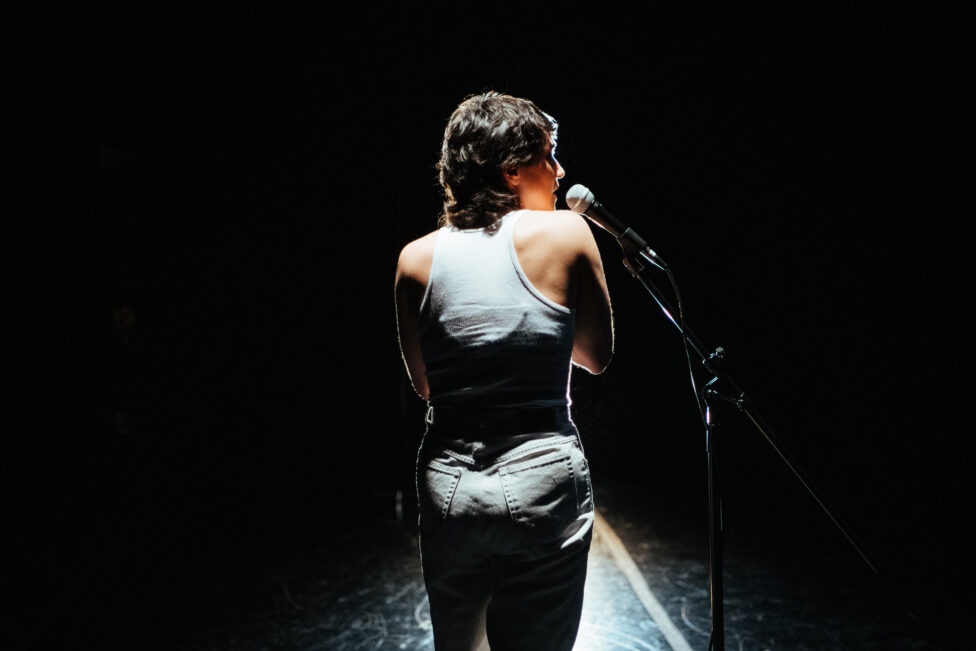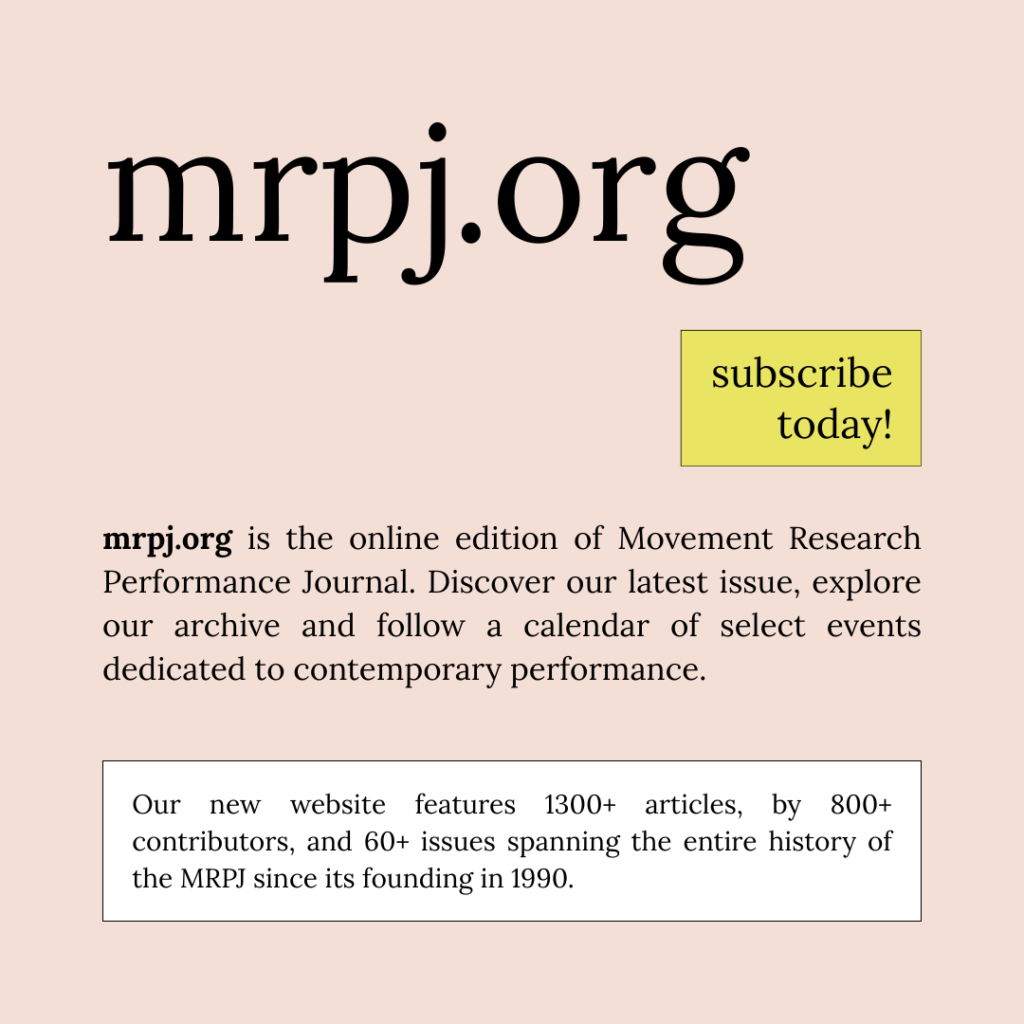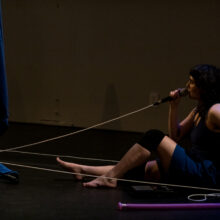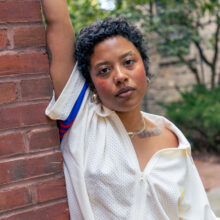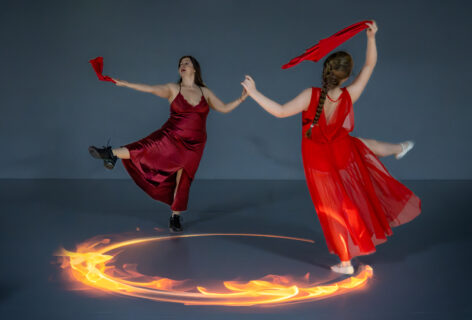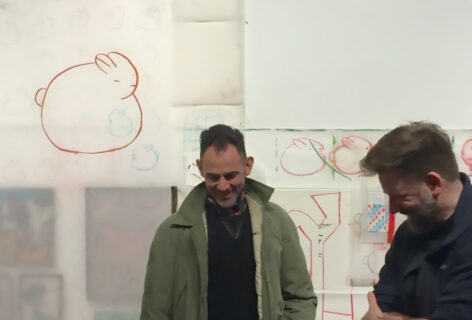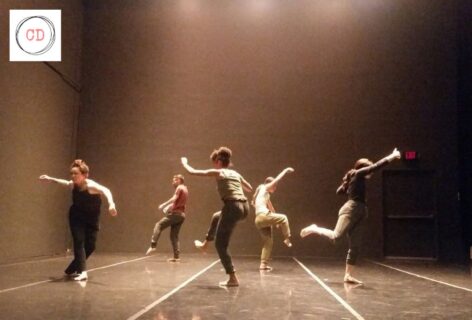This conversation was a first meeting between Allie Hankins and Symara Sarai—two powerhouses of play, wit, and subversion. Though they’d just met, the two found many overlaps (such as Portland, Oregon!) and go on to discuss tuning into timing—timing of audience needs, of an idea taking shape, of spirit moving through, or just the duration of a piece. Performance is a way for each of these artists to show you their strengths. So they both rightly push back against perceptions of vulnerability, especially when the work is crafted and designed. Yes, there’s openness to possibility and this is vulnerable. Also: the work was designed to hold this. These two makers find ways to stay curious, tend to composition, and listen to each other. Thanks Symara and Allie for saying yes to this invitation.
-Londs Reuter, CC Co-Editor and Annabelle Stern, CC Intern
This article has been edited for the purpose of publication.
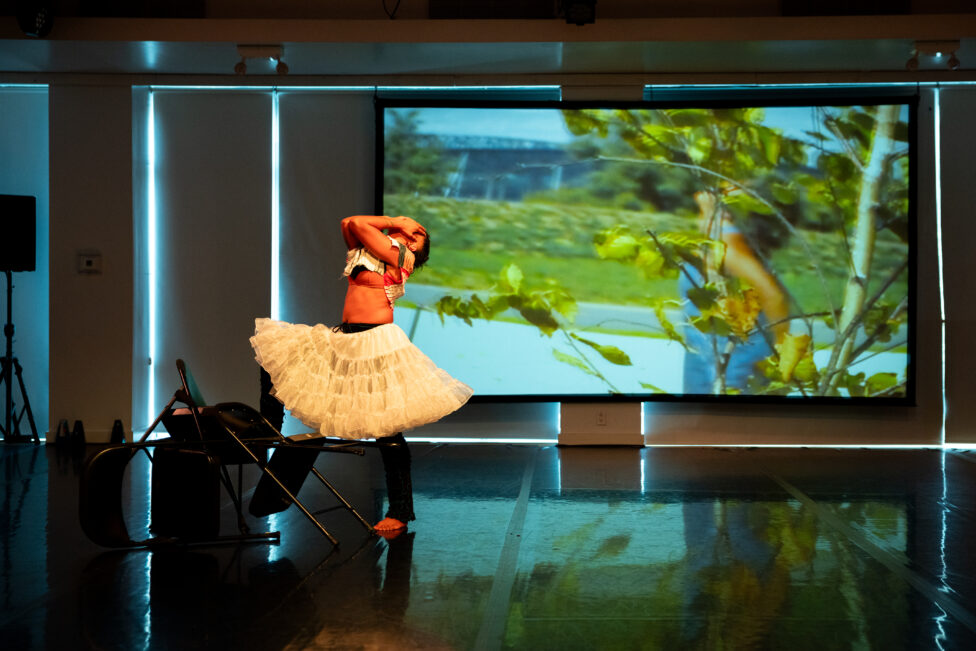
Image by Maria Baranova.
Symara Sarai
I’ve always really craved knowing how to be inside of dance in Portland, because it was something that I felt like I had to, like, leave to get to?
Allie Hankins
Totally, yeah. You grew up here, right? I imagine growing up here, you would feel like “I need to break out!”
SS
Yeah, totally. Now that I’m older, I’ve been so desirous of the return. I want to know how to come home and be in my practice. No matter where I go, I hold such deep pride for being a Portlander.
AH
Something I noticed in your work is the way you kind of use autobiography or maybe, lineage or family lore, to guide how you make things. One thing I was particularly struck by and feel like I really relate to is the lasso, and how you’re really diligently practicing it as this way to connect to your father, or at least that’s how I read it.
SS
As dancers, you start with the first object: the medium of the body, as a way to understand or digest what’s inside of you and what’s occurring around you. To use my vessel as a way to understand where I come from and who I am—that’s inherently there.
When people ask me how I’m drawn to certain objects, I always tell them it’s way less miraculous than it seems. It’s as simple as a “call.” Truly. And then the relationship is built over time.
AH
Yes.
SS
Eventually, I thought, “This feels like a way that I can identify or understand my father”—who I didn’t have much information on. That gave me an access point to construct a narrative for someone I didn’t know. Which is exactly what my body does.
I work with objects as portal openers—to access a depth of people trying to speak through me. Accessing the ancestral plane, or whatever that looks like for each person. For me, it feels like I have people in my court who come down and use the vessel to perform and be seen.
I’ll work with the lasso or chairs. Sometimes I dream about an object, but usually it’s just what’s already in the space. I’m sure you know that feeling as a whimsical improvisational artist: “Well, I’m improvising in my kitchen—guess my next piece has a refrigerator.”
I appreciate the success and failure of a thing. I’m here to experiment fearlessly. I create spaces where I have autonomy. I’m curious: What’s your relationship to objects?
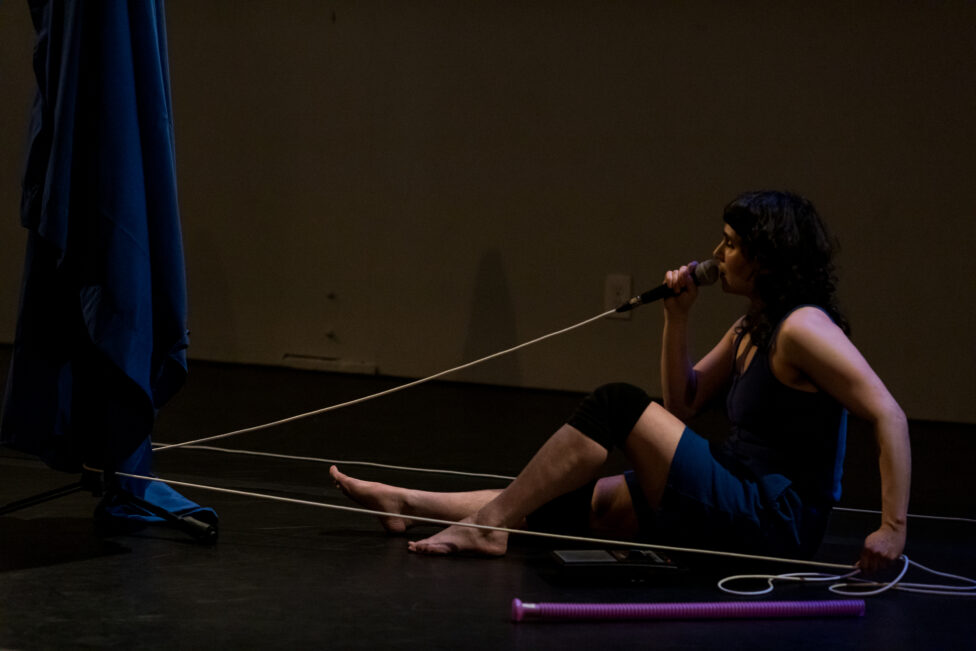
Image by Michelle Smith.
AH
Right now, I’m working with tape recorders. I have a bajillion of them. shows tape recorders
My friend Lu Yim told me about looping tapes, from three seconds to two minutes. I’m recording room sounds, a song in five parts, or my recount of a dream—then playing and overlapping them.
This way of looping and making sound is very physical. It’s spatialized. It can’t just exist anywhere—it only comes from the tape it’s on. And it’s temporal—it lasts as long as the tape. So I’m tracking spatial and temporal patterns as I perform with the sounds.
It’s unlocked a new part of my brain that can cast spells and create sonic tapestries—layered choruses of my voice that become other characters in the room.
I need to shout out Linda Austin, based in Portland. She’s an object-interaction extraordinaire. I’ve been influenced by her since moving here.
SS
It’s fascinating how intuition is at play subconsciously. The work blooms behind the scenes, and you don’t even realize the labor happening.
I’m similar. I record everything—to a fault.
Your talk about sonic tapestries resonates. I recently did a piece at New York Live Arts, focused on Black, queer, femme autonomy as a container for whatever we want.
Without planning, I put metronomes in the space. There was something urgent about echo and disrupting silence. The ticking activated the body—and suddenly, we were actionable to desire.
It just felt grounding to have sound alive in the room.
AH
It’s funny you mention metronomes—my tape recorders started as timers. Five-minute countdowns. Every action took one minute: shifting a light, removing a sweatshirt, whipping a mic cable.
That container of time made me more present. It added weight to every moment.
I relate to putting something in the space to create tension—even frustration. I can imagine the metronome’s ticking got on your nerves. But that activation? That’s material.
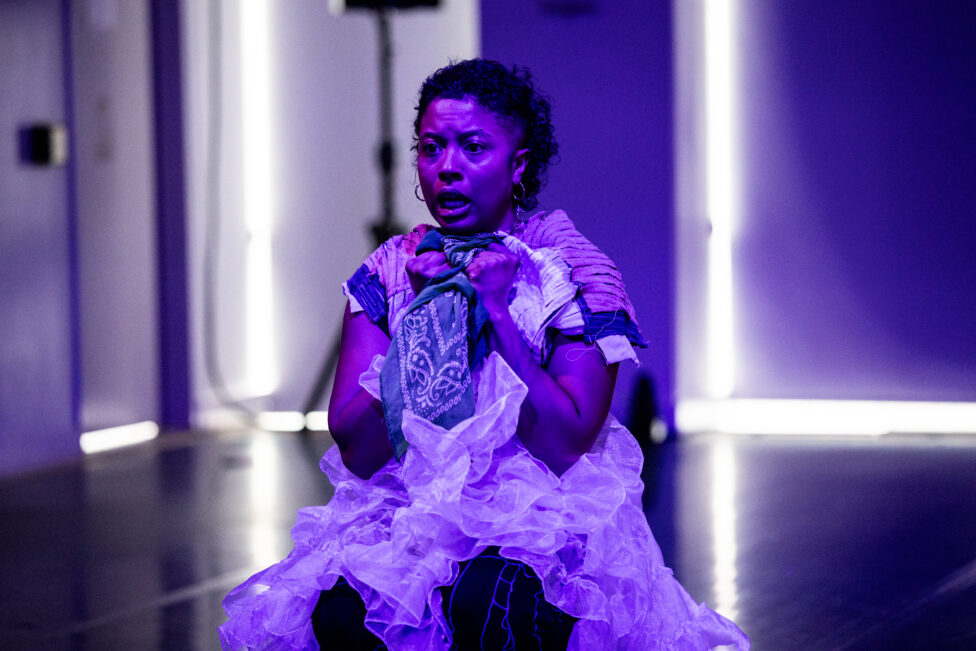
Image by Maria Baranova.
SS
I have to shout out Joanna Kotze. When I started working with her, she introduced this practice—setting time inside your improvisational body. It anchors you in freedom or frenzy. Just knowing you have two minutes lets you fully abandon.
One day, we said, “Let’s get wild. Let’s do four minutes.”
I’ve been thinking a lot about time in performance—especially the expectation of an “evening-length” work. Like we’re married to 45 or 90 minutes, instead of to the content.
When I see work now, I notice that distinction: the marriage to time vs. the marriage to content.
AH
Oh, totally. That’s really interesting. So your works are typically more concise in terms of time?
SS
Yeah, like, the longest work that I’ve ever made… I had a solo recently, and it was 45 minutes. Just me, sometimes 50. Now, witnessing some of my peers, they presume “evening-length” means a certain duration.
AH
I mean, that’s a really interesting question, though, right? Like, how much are we considering the audience and people coming? I really deeply consider my audience, actually. I mean, of course, just like all of us, I guess, I have a sort of, like an ambivalent relationship to how much I’m serving an audience, or, like, how much I’m catering to them, but, I mean, I love my audience. I love that people are here watching me. I am a terribly shy, very insecure human, but somehow I was given the skill of being able to be fully confident and kind of like a ham on stage. And for me, if you aren’t here, I wouldn’t be able to do this, and I have to do this for my life to mean anything to me.
I have this really strong symbiotic relationship to an audience. I don’t necessarily need them to feel good or even love what I did, but I want them to feel a mutual respect.
SS
Totally! I love that you said you love your audience, because I feel the same way. And I really, really appreciate spending time on things like, caring about what’s being witnessed. Not necessarily about how it will be received, but just like an attention to… “This is something that will be consumed, and the ride of the audience matters to me.”
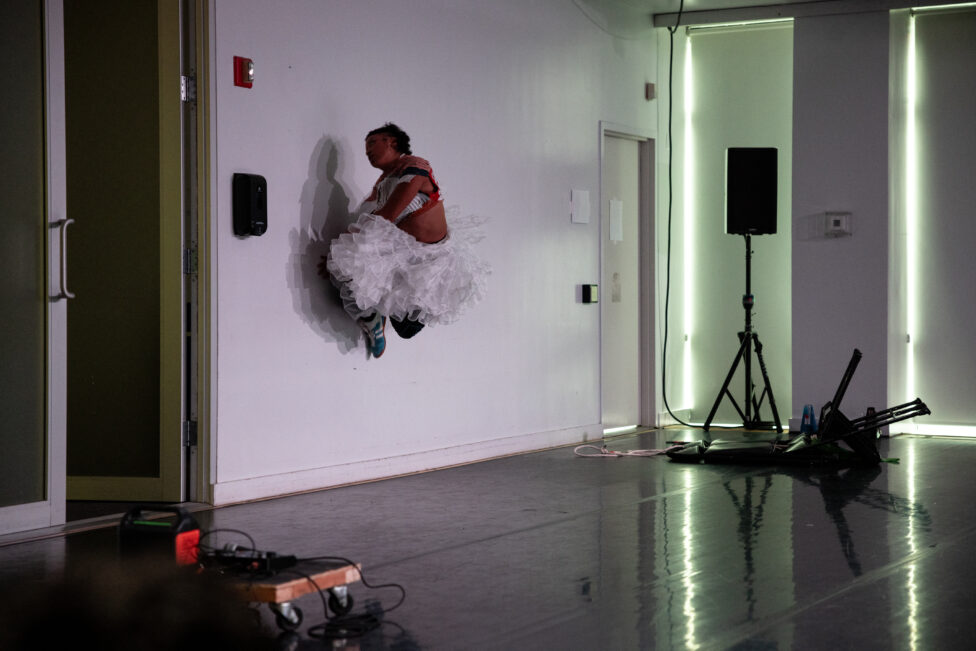
Image by Maria Baranova.
AH
I’m curious, because I’ve read a few reviews of your work about what they call the breaking of the fourth wall. I’m curious about your relationship to your audience, because I often talk directly to my audience, and have conversations with them, or am at least really looking them in the eye as I’m speaking or as I’m dancing. I’m really trying to invite them in and give them a way to access while also sort of hiding in plain sight, like, they don’t have full access. But I’m curious about your relationship to that, and if it’s a preconceived idea, or if it just happens in the moment.
SS
I feel really powerful when I’m on stage, because I’m like, I know what you want. You know what I mean? I have the power to make decisions. I’m just acknowledging that there are people in the room. I’m interacting with them in a way where I can go with the expectation, or rebel against it. I really enjoy the absurdity of performance. I think it’s so special to have this moment to be witnessed however you desire. There’s something for me that’s really liberating about that. I feel completely boundless and free. I’m like: anything could happen right now. This only exists in this specific moment.
AH
It’s such a funny, weird thing to be attuned to, right? I didn’t even know I was attuned to it until I started making performances, and I was like, Oh, I kind of have this sense. I can read people in this really specific context. Kind of what you’re saying: I know what they want.
I’m sure there are times when people are like, “I did not want that,” and that’s fine. For me, I think, something that I hear a lot is, “Oh, you’re so vulnerable on stage!” And I’m like, “I’m not actually.” When I’m doing this, this is the most confident, most powerful, most like in myself that I ever am. I don’t feel vulnerable at all. And whatever you’re feeling like you have access to is highly constructed by me. This is not an accident.
SS
There’s something interesting about that word vulnerability. For a long time, I almost felt like that description was like making me small. I’m like, Hold up! I’m actually fine! I’m good, like, I wouldn’t put something on stage that I couldn’t survive after. And actually, the most vulnerable I feel on stage is when I’m in a situation where I have to hit the count at the same time as everybody else. It’s clear when I don’t. Those are vulnerable situations that make me feel like less engaged with my power.
Sometimes even, after a show, people ask me, “How are you doing? Are you okay?” And I’m like, “Yeah! I’m doing great. I’m on top of the world.” I just had so much fun on stage. I think because you’re talking about things that others might feel apprehensive to speak about, people see that you really put it all out there. What is this association with honesty and being not okay? I was just honest, and this is my life. Yeah, I’m fine. I’m okay with you knowing.
AH
Yeah, yeah. And, my intention here wasn’t to, like, get you to appreciate me or assign value to what I just did because I’m being vulnerable. The merit of my work does not rest on vulnerability—is what I always get frustrated about. It’s not just because I’m out there taking some risks performatively, but, also, can you acknowledge that I just created this? I crafted this. I built this.That is hard work and takes hours and hours of showing up to the studio, not knowing what the fuck I’m doing, not knowing where the hell this is going, pretty sure it’s not gonna work out, pretty sure it’s not gonna come together. It is a little bit dismissive. It’s not so much what I’m going for, you know?

Image by West Smith.
SS
I really appreciate you naming the craft of the thing. I’m seeing this synergy that we have in common which… it’s a talent. We both go into the room and we’re able to construct something out of the not-knowing. That’s a foundational thing to making the work. I think some of the best work is birthed out of going into space and not knowing what you’re doing. And so I’m like, yeah, “can you acknowledge that I stay curious about my life, that I stay curious about the world?”
AH
I love continually showing up with curiosity, with not-knowing, so that these things can reveal themselves to us. I’m thinking of this one moment in a video of yours that I watched where, like, the music was too quiet, and you were like, “Louder!” and the audience was like, “Okay!” and started yelling and shouting. You’re like, “The music, not you!” While you’re like, running and dancing, like, really hard. And I loved that moment, because I got to see this real-time curiosity. It revealed how in-tune you were with your audience and how in-tune they were with you. Anyway, I’m thinking of that moment in relation to this conversation because it was so clear and it was so funny and just like expertly existed inside of… you know?
SS
I really appreciate you bringing that forward and shining light on that. That’s really, yeah, thank you. I would love to see what you’re making in-person, and I’ve just been so curious about getting to see more dance in Portland. I’d love to hear what you’re up to next and what that looks like.
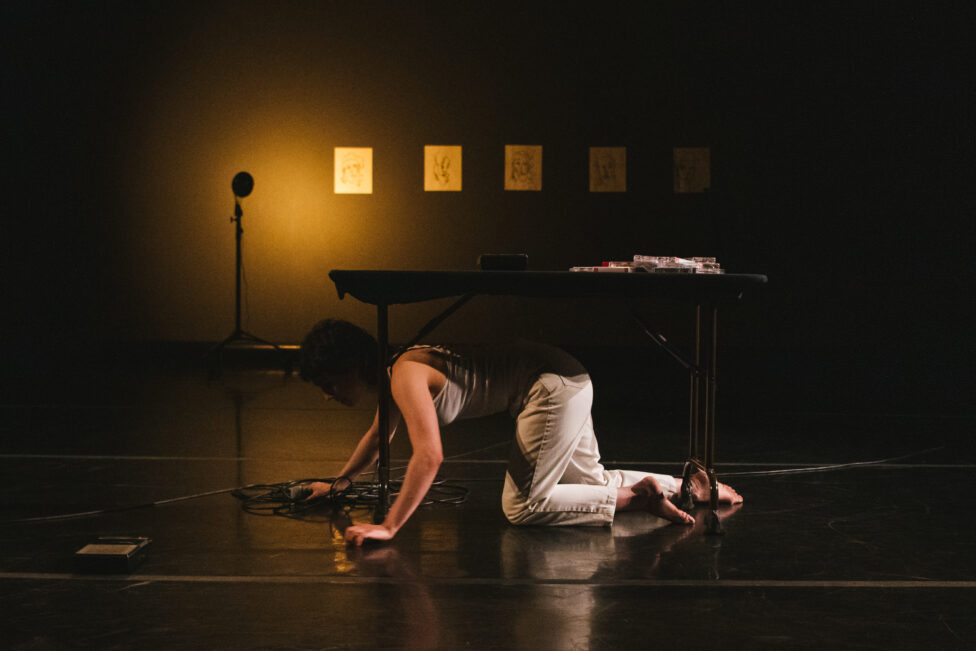
Image by West Smith.
AH
Yeah, so the last solo of a series is premiering July 11-13 at Shaking the Tree Theater. And then part five of the series will premiere next year, probably in September 2026. [This upcoming solo is] part four of a series. And they all build on and deconstruct the previous parts. I have almost 10 years worth of material at this point. How the fuck am I gonna distill it down to a 45 to 60 minute show?
It’s just me and all my props. My joke is always that I’m your next favorite prop comic, because I just have all these like things and I carry around with me. And while I’ve been accumulating the material for 10 years, I can create something pretty quickly. You know what I mean? Everything can come together in a way that’s unexpected and exciting. I’m really excited about it. I had been really stressing, but now I am excited to inhabit this world that I’m making. And that’s a really good feeling, right? To be excited about it.
SS
I know that feeling. The stress and then the surprise and relief of, like, I have something! Because there was also the chance that you come out the other side, like, What the fuck?
AH
But then two years later, you look back at that and you’re like, “Oh, I was on my way here the whole time.”

